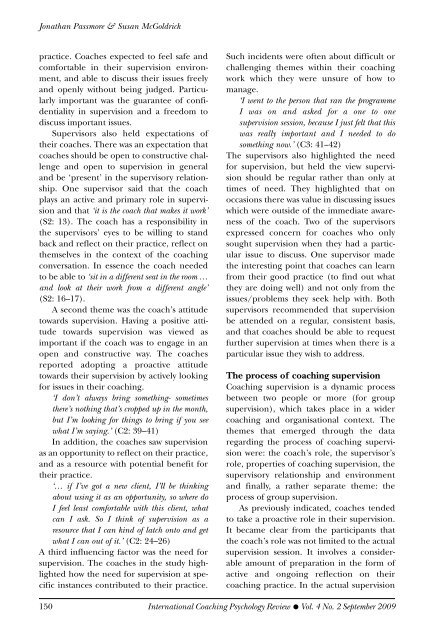International Coaching Psychology Review, 4.2, September 2009
International Coaching Psychology Review, 4.2, September 2009
International Coaching Psychology Review, 4.2, September 2009
Create successful ePaper yourself
Turn your PDF publications into a flip-book with our unique Google optimized e-Paper software.
Jonathan Passmore & Susan McGoldrick<br />
practice. Coaches expected to feel safe and<br />
comfortable in their supervision environment,<br />
and able to discuss their issues freely<br />
and openly without being judged. Particularly<br />
important was the guarantee of confidentiality<br />
in supervision and a freedom to<br />
discuss important issues.<br />
Supervisors also held expectations of<br />
their coaches. There was an expectation that<br />
coaches should be open to constructive challenge<br />
and open to supervision in general<br />
and be ‘present’ in the supervisory relationship.<br />
One supervisor said that the coach<br />
plays an active and primary role in supervision<br />
and that ‘it is the coach that makes it work’<br />
(S2: 13). The coach has a responsibility in<br />
the supervisors’ eyes to be willing to stand<br />
back and reflect on their practice, reflect on<br />
themselves in the context of the coaching<br />
conversation. In essence the coach needed<br />
to be able to ‘sit in a different seat in the room …<br />
and look at their work from a different angle’<br />
(S2: 16–17).<br />
A second theme was the coach’s attitude<br />
towards supervision. Having a positive attitude<br />
towards supervision was viewed as<br />
important if the coach was to engage in an<br />
open and constructive way. The coaches<br />
reported adopting a proactive attitude<br />
towards their supervision by actively looking<br />
for issues in their coaching.<br />
‘I don’t always bring something- sometimes<br />
there’s nothing that’s cropped up in the month,<br />
but I’m looking for things to bring if you see<br />
what I’m saying.’ (C2: 39–41)<br />
In addition, the coaches saw supervision<br />
as an opportunity to reflect on their practice,<br />
and as a resource with potential benefit for<br />
their practice.<br />
‘… if I’ve got a new client, I’ll be thinking<br />
about using it as an opportunity, so where do<br />
I feel least comfortable with this client, what<br />
can I ask. So I think of supervision as a<br />
resource that I can kind of latch onto and get<br />
what I can out of it.’ (C2: 24–26)<br />
A third influencing factor was the need for<br />
supervision. The coaches in the study highlighted<br />
how the need for supervision at specific<br />
instances contributed to their practice.<br />
Such incidents were often about difficult or<br />
challenging themes within their coaching<br />
work which they were unsure of how to<br />
manage.<br />
‘I went to the person that ran the programme<br />
I was on and asked for a one to one<br />
supervision session, because I just felt that this<br />
was really important and I needed to do<br />
something now.’ (C3: 41–42)<br />
The supervisors also highlighted the need<br />
for supervision, but held the view supervision<br />
should be regular rather than only at<br />
times of need. They highlighted that on<br />
occasions there was value in discussing issues<br />
which were outside of the immediate awareness<br />
of the coach. Two of the supervisors<br />
expressed concern for coaches who only<br />
sought supervision when they had a particular<br />
issue to discuss. One supervisor made<br />
the interesting point that coaches can learn<br />
from their good practice (to find out what<br />
they are doing well) and not only from the<br />
issues/problems they seek help with. Both<br />
supervisors recommended that supervision<br />
be attended on a regular, consistent basis,<br />
and that coaches should be able to request<br />
further supervision at times when there is a<br />
particular issue they wish to address.<br />
The process of coaching supervision<br />
<strong>Coaching</strong> supervision is a dynamic process<br />
between two people or more (for group<br />
supervision), which takes place in a wider<br />
coaching and organisational context. The<br />
themes that emerged through the data<br />
regarding the process of coaching supervision<br />
were: the coach’s role, the supervisor’s<br />
role, properties of coaching supervision, the<br />
supervisory relationship and environment<br />
and finally, a rather separate theme: the<br />
process of group supervision.<br />
As previously indicated, coaches tended<br />
to take a proactive role in their supervision.<br />
It became clear from the participants that<br />
the coach’s role was not limited to the actual<br />
supervision session. It involves a considerable<br />
amount of preparation in the form of<br />
active and ongoing reflection on their<br />
coaching practice. In the actual supervision<br />
150 <strong>International</strong> <strong>Coaching</strong> <strong>Psychology</strong> <strong>Review</strong> ● Vol. 4 No. 2 <strong>September</strong> <strong>2009</strong>

















